Why do businesses need Transportation software development?
Every year transportation industry loses more than $20 Bn due to logistics malfunctions.
Moreover, large-scale enterprises and organizations struggle with freight loss as they cannot transport with sufficient load.
And who doesn’t want to manage their fleet of vehicles more efficiently?
The biggest challenge that businesses are facing today is managing their logistics. Transport software development is essential for businesses in the transportation industry or any organization that relies heavily on transportation for its operations.
A survey conducted by Statista shows that about 59% of transportation and logistics companies reported using transportation management software to optimize their operations.
The transportation management system is an essential tool for enterprises as they save delivery time and decrease costs and enhances the process of the supply chain.
The same-day shipping trend has accelerated the build transportation management software, as it creates a competitive environment for brands to meet customer demand as soon as possible way.
Despite being the most useful of TMS solutions many entrepreneurs, and 3PL providers still wonder if investing in transport software development is a good idea. If this is where you are stuck, with our blog we will help you to declutter.
Transportation Software Development: Stats and Facts That Matter
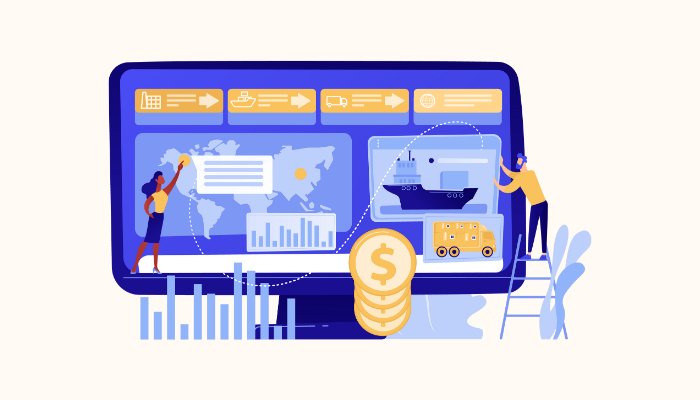
“Transportation software is the key to improving efficiency, productivity, and profitability in the transportation industry.” – American Trucking Association
Before we dive into the stat let’s start with what is transportation software.
Transportation software also known as transport software or logistics software, refers to a category of specialized computer programs and applications designed to streamline. And optimize various aspects of transportation and logistics operations.
Therefore, these tools help manage, track, and enhance the efficiency of the transportation process. That ultimately leads to cost savings, improved customer services, and overall better performance.
The Transportation and logistics market are booming as per market stats it doesn’t show the sign of slowing down any time soon.
- The global transportation software market in 2023 is USD 13.5 bn and is expected to reach USD 33.3 Bn by 2028 according to
- At a compound annual growth rate CAGR of 19.7 % during the forecast period.
- The leading region of the transportation and logistics software market
| North America (US, Canada, Mexico)
|
| Europe (Germany, UK, France, Italy, and Russia)
|
| Asia –Pacific (Japan, Korea, India, Australia, and the Philippines )
|
| South America ( Brazil, Argentina, and Columbia )
|
| Middle East and Africa ( UAE, Egypt, and South Africa )
|
While these were the transportation market insights, it’s time to discuss what benefits it offers for businesses.
Benefits of transport software development for the business
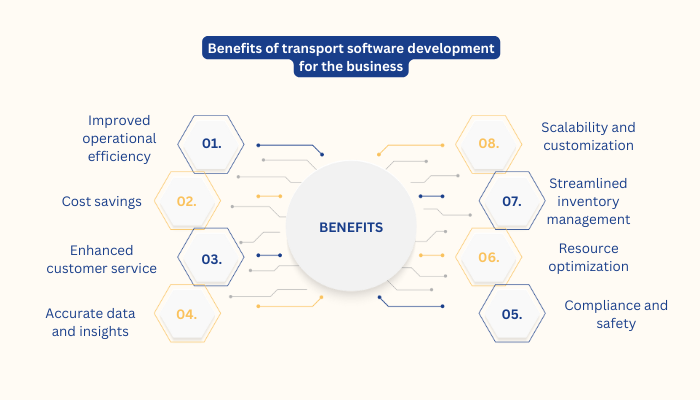
Transportation software management has roles in managing the logistics of a company. Therefore transport software development is an important factor for companies that provide effective management and seamless customer experience.
Here is the list of benefits of transport software development for the business:
Improved operational efficiency
With transportation app software development streamlines various transportation processes, such as order management, route planning, and fleet tracking.
Moreover, it automates tasks, reduces manual work, and enhances overall efficiency leading to faster and smoother workflows.
Cost savings
By optimizing routes, reducing fuel consumption, and minimizing inefficiencies, transport software helps businesses save on operational costs.
It can also identify areas of excessive spending, allowing companies to make data-driven decisions to cut expenses.
Enhanced customer service
Transport software provides real-time tracking and accurate delivery estimates, improving customer communication and transparency.
Accurate data and insights
Transport software generates vast amounts of data related to shipments, routes, vehicle performance, and more. With this data analysis, it gives valuable insights enabling businesses to identify trends, optimize operations and make informed strategic decisions.
Compliance and Safety
Transport software helps businesses adhere to transportation regulations and safety standards. It can track driver hours, monitor vehicle maintenance & ensure compliance with industry-specific requirements reducing the risk of penalties & accidents.
Resource optimization
With transportation software development, businesses can easily manage their fleet, drivers, and other resources. Plus, it ensures that vehicles are utilized optimally, reducing downtime and increasing productivity.
Streamlined inventory management
Businesses that deal with logistics and inventory, integrate transport software with inventory management systems. This allows smooth coordination between transportation and warehouse operations.
Scalability and customization
Custom transport software development allows businesses to tailor the solution to their specific needs. The software can be scaled and adapted as the company grows or changes its operational requirements.
Key features of Transport software development
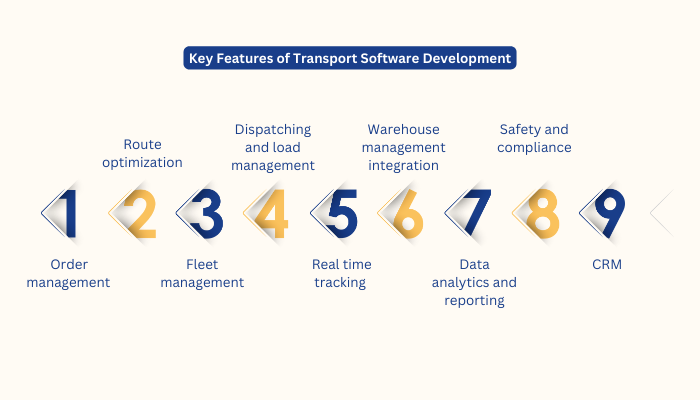
43% of the market was covered by cloud-based transportation systems in 2021, due to its affordability and convenience. It was adopted by giant tech companies and the rest of the organizations with this it’s crucial to decide on the features before starting logistics and transportation software development.
With this let’s look at some important features of the transportation software.
Order management
This is the most important feature before you start transport software development. It allows businesses to handle incoming orders, manage shipments, and schedule deliveries.
Moreover, it includes functionalities such as order tracking, status updates, and order prioritization.
Route optimization
With this feature businesses find the most efficient and cost-effective routes for deliveries, taking into account factors like distance, traffic conditions, and delivery deadlines.
Fleet management
Fleet management features enable businesses to track and manage their fleet of vehicles. It includes real-time tracking, fuel monitoring, and driver performance evaluation.
Dispatching and load management
It’s obvious to integrate these tools as it helps in assigning drivers and vehicles to specific orders, ensuring timely deliveries. Moreover, load management features ensure that vehicles are loaded optimally to maximize capacity and minimize empty trips.
Real-time tracking
Real-time tracking provides businesses and customers with up-to-date information on the location and status of shipments, enhancing transparency and customer satisfaction.
Warehouse management integration
Integration with the warehouse management system while starting transportation software development is considered a feature. It helps allow seamless coordination between transportation and warehousing operations and reduces lead times.
Data analytics and reporting
When you hire a logistics app development company ask them to integrate data analytics and reporting features as they offer valuable insights into data related to routes, shipments, and fuel consumption for better decision-making.
Safety and Compliance
The most important features of safety and compliance feature help businesses adhere to transportation regulations and safety standards. This includes driver log management, vehicle inspection tracking, and compliance reporting.
CRM
Last but most crucial feature for businesses as it allows for managing customer information, communication, and preferences by enhancing customer services and relationship management.
How custom transportation software development helps your business grow?
As per Deloitte’s insights, there is no one size fits all transportation software development that caters perfectly to all parties within the supply chain.
Due to this variability, your logistics requirements may necessitate the adoption of custom software solutions.
However, managing the supply chain and logistics operations is a daunting task some software development for the transportation & logistics industry easily manage transport systems without any hindrances.
With this being said, let’s look at the types of logistics and transport software development.
Top 6 types of logistics and transportation software development
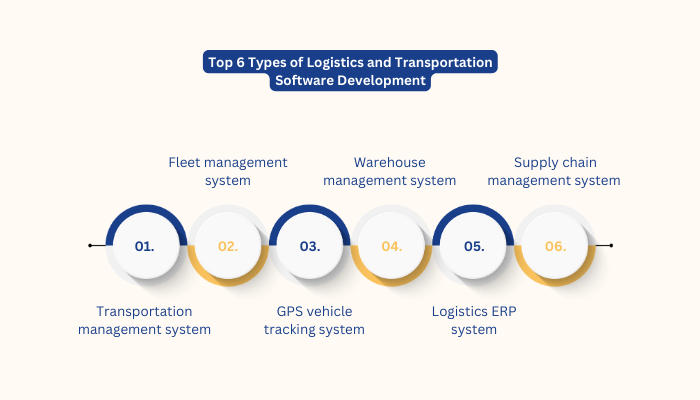
To help you move on to transportation app development we are providing you with the list of majorly used transportation and logistics software’s in the market.
Transportation management system
With transportation management software transportation of goods can be easily executed and optimized. In other words, TMS is a part of supply chain management focused on handling cargo and product shipment needs.
Fleet management system
A fleet management system helps businesses to manage commercial vehicles like vans, trucks, cars, and trailers.
While it offers a managerial approach for companies to efficiently coordinate and organize commercial vehicles, it also ensures compliance with minimizing costs.
GPS vehicle tracking system
To monitor vehicle location and track fuel consumption in real-time, it necessitates installing a tracking device in the commercial vehicle. This enables companies to gain insights into potential movements and delays.
Warehouse management system
Transportation software development enables companies to manage and oversee warehouse operations effectively with the warehouse management system.
Moreover, it streamlines warehouse organization, inventory management, order fulfillment and more offering exceptional control & transparency over all warehouse activities.
Logistics ERP system
Logistics ERP software empowers businesses to efficiently manage inventory, enhance distribution and optimize staff operations. It not only streamlines distribution channels but also reduces delivery times.
However, Fortune 500 companies often employ robust ERP software solutions tailored to their specific needs for sustained success and growth.
Supply chain management system
Lastly, supply chain management software streamlines, manages, and tracks the entire supply chain process. It enables businesses to respond rapidly to demand fluctuations, optimize inventory costs and address supply chain bottlenecks effectively.
How much does it cost for transportation software development?
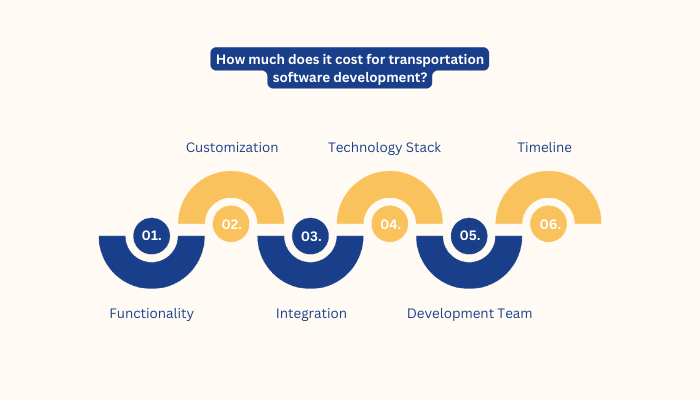
Developing any software with an expert mobile app development company is easy but transportation software development is not an easy feat. Most transportation software development services providers can cost up to $30,000 to $200,00.
The cost depends on the software features, complexity, developers’ location, and several other factors.
However, for more advanced and comprehensive solutions with customizations, integrations, and AI capabilities the cost could go up to $300,000.
Let’s look at the factors that influence the cost including:
Functionality
The number and complexity of features you want to include in the software.
Customization
If you need a highly customized solution tailored to your specific business needs.
Integration
The complexity of integrating the software with other existing systems or third-party services.
Technology Stack
The choice of technology and development platform.
Development Team
The size and expertise of the development team and their hourly rates.
Timeline
The development timeline and any urgent requirements.
It’s essential to discuss your project with multiple transportation software developers to get detailed proposals and estimates.
They can better understand your needs and provide you with a more accurate cost based on your specific requirements.
Why choose Nimble AppGenie for Transportation software development?
Nimble AppGenie is an experienced mobile app development company with proven working experience. We specialize in providing custom software solutions, including transportation software development.
Here are some reasons why you should choose us:
- Experience
- Expertise
- Cost-effectiveness
- Customer satisfaction
Lastly, we have a proven track record of success, with a 99% client retention rate.
Remember that investing in high-quality software development can lead to significant efficiency improvements and cost savings in the long run.
Conclusion
Transportation software development solutions can be a valuable tool for businesses of all sizes. If you are looking for ways to improve your transportation operation and grow your business, then transportation software development is a great option to consider.
We hope that with this blog you get to know everything about transportation and logistics app development benefits. If you want to know more feel free to contact us.
FAQ
The benefits of transportation software development include:
- Improved efficiency
- Improved visibility
- Reduced costs
- Improved compliance
- Improved customer service
- Increased profitability
The features of transportation software development include:
- Fleet management
- Shipment tracking
- Route optimization
- Fuel consumption tracking
- Weight and safety compliance
- Customer service
- Reporting and analytics
The costs of transportation software development vary depending on the size and complexity of the software. However, the average cost of developing transportation software is $250,000.
The development time for transportation software varies depending on the size and complexity of the software. However, the average development time for transportation software is 6-12 months.
The challenges of transportation software development include:
- Understanding the needs of the business
- Choosing the right technology
- Managing the development process
- Testing and deploying the software
When choosing transportation software, it is important to consider the following factors:
- Size & complexity of your business
- Specific needs of your business
- Features &functionality of the software
- Level of support that is required

Niketan Sharma is the CTO of Nimble AppGenie, a prominent website and mobile app development company in the USA that is delivering excellence with a commitment to boosting business growth & maximizing customer satisfaction. He is a highly motivated individual who helps SMEs and startups grow in this dynamic market with the latest technology and innovation.
Table of Contents











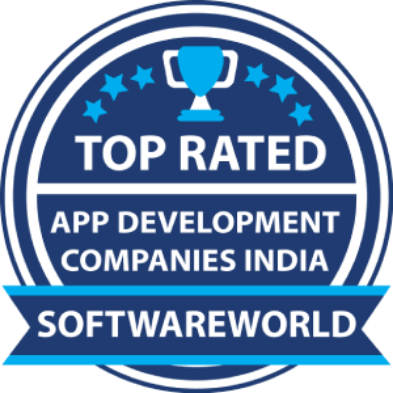
No Comments
Comments are closed.